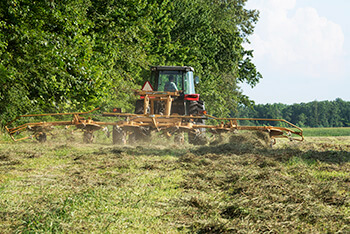Farm Equipment Maintenance
Jan 06, 2020

Now is the perfect opportunity to take advantage of winter downtime and perform farm equipment maintenance. By performing maintenance work and repairs now, you’ll feel less rushed come springtime. Here are 10 tips to follow:
- Grease all fittings
- Check fluid in gear boxes
- Slip clutch discs on PTO shaft (if equipped with slip clutch, then reset to correct tightness)
- Check belt tightness to correct tension
- Check for cracks in belts; they may need to be replaced
- Repack hub bearing if low or if grease is dried out
- Check condition of rake, tedder and baler teeth
- Check cutting blades for cracks and oversized holes; worn blades may need to be replaced
- Check batteries
- Check for excessive equipment wear